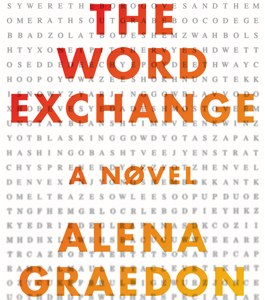Hands up now if you think lexicographers and/or their visual artist daughters make great protagonists of action-packed novels. Nobody? Okay, what about a book about slimy tech-start up young-jerkface whipper-snappers who unleash a virus on the entire world because they want to make money fast; does that sound awesome?
If I’ve lost your interest in either of the above, then you’re probably not going to like the new novel The Word Exchange. But if you’re like me and the notion of dictionary lovers as heroes and smarmy new-media guys as villains sounds great to you, then this is our book of the year.
I’m going to get this out of the way right now: The Word Exchange will probably not get nominated for a Hugo or a Nebula next year, and it really should. The entire purpose of the Genre in the Mainstream column is to bring wonderful books—not being marketed and publicized as science fiction— to the attention of SF fans and readers. I’m sure SF traditionalists (who I’m not sure exist?) have sort have scoffed at my attempts to shoehorn Lemony Snicket or Miranda July into wire-racks of SF, but seriously guys, this time, I’m really, really right. This is the mainstream lit novel that truly is speculative fiction, science fiction, and just plain awesome fiction all at once.
Set in a near future New York City, The Word Exchange stars Anana, twenty-something daughter of Douglas Johnson, editor of the North American Dictionary of the English Language, or NADEL as it’s abbreviated throughout the book. Anana (called Ana for short) does some work for her father at “The Dictionary,” as does her friend Bart (short for Bartleby!) But, right at the start of the novel, Ana’s father goes missing, as does any entry about him in an electronic version of a dictionary.
Ana’s recently been dumped by her old boyfriend Max, a guy with a start-up company called Hermes that’s just been acquired by a larger media mega-giant: Synchronic Inc. And it’s here where the novel introduces its true antagonist: a handy do-anything device called a “Meme.” More than an iPhone and partially a miniature computer and e-reader, everyone’s Meme is also an intuitive device. After being familiarized with its user, it can do all sorts of things for them, like calling them a cab when they’re drunk, or sharing the contact information with someone they are hitting on. Countless apps and games are incorporated into the Meme, with The Word Exchange being the early harbinger of the doom this book ends up unleashing.
In this world, tons of people have begun to actually forget the meanings of tons words, and instead rely on their Meme and The Word Exchange in order to remember what they need to know. As the book progresses, it’s revealed that Synchronic has purchased the rights to nearly all words from the various major dictionaries. Echoing the real-life drama of various publishers, the publishers here decide to give Synchronic what they want, since they figure there’s no way to actually make money off of copyrighted language. But the more and more people become reliant on Memes for their basic communication, the more words cost, and suddenly Synchronic is in charge.
Through the introduction of a device you strap to your head called The Nautilus and a new game/app called “Meaning Master,” a dangerous strain of aphasia strikes New York, which starts being referred to was “word flu.”
There’s more! So much more! But if I got into more specifics than I already have, I feel like it would ruin too much of the suspense and surprise this novel delivers. To be fair, I was initially skeptical of this novel’s premise as it seemed like a kind of mash-up between Super Sad True Love Story and The Flame Alphabet, and in a sense, it totally is. But whereas Super Sad True Love Story told a story about several SF themes (immortality, information gaps through technology) and The Flame Alphabet meditated on how language could become physically harmful, neither of the books was as realistic as The Word Exchange. This isn’t to say this books is better than those other two, because that’s just crazy and I love them all, equally, like little aphasiac children. But, if all three are a kind of science fiction, then The Word Exchange is the closest of the three to hard SF.
Graedon’s novel is rowdy with its judgment of intellectual laziness, and the author’s almost heavy-handed love of the written and printed word comes through constantly. Here, curing the illness that strikes the world is literally combated by abstract thinking and reading real books. Lexicographers and etymologists in this book become stand-ins for the medical professionals working around the clock in big-deal “outbreak” stories. But this book is never preachy in a way something else—like say 1984—might be. Instead, Graedon doesn’t really rely so much on metaphor as she does on excellent speculation. I’m convinced by The Word Exchange that not only could all of this happen, but that it maybe, in fact, is.
Fittingly or not, I read the entirety of this novel on my E-reader, and as Bart’s words on the page literally became slurred and his aphasia bled into the novel itself, I too found myself a little dizzy with “word flu.” And when I finished the last page of the novel, I felt epically creeped-out by the fact that I couldn’t actually slam its cover.
Ryan Britt is a longtime contributor to Tor.com and the creator of the Genre in the Mainstream column. His favorite Internet video-thing is easily the “Ask the Editor” series from Merriam-Webster.










